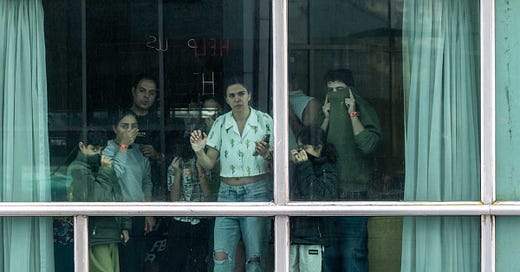In Iran, the act of converting from Islam to any other religion is punishable by death. In America, one of the strongest historical rationales for immigrants seeking asylum has been the fear of religious persecution.
Yet on February 9, when Artemis Ghasemzadeh, an Iranian Christian convert, crossed the U.S.-Mexico border, after an arduous trip that took her from Iran to Dubai to South Korea and finally Mexico, she said she was never asked about her reasons for seeking asylum. Instead, she said, U.S. Customs and Border Protection (CBP) agents put her in shackles, walked her onto a military plane, and flew her to Panama. They did the same to at least 10 other Iranian Christians, including three children. They all remain stuck in legal limbo in Panama to this day.
Repatriating migrants through Panama is not a new policy, but during the Biden administration, it was used only for those who were already in Panama. Once Trump took office, the arrangement was expanded, with Panama agreeing to accept migrants deported from the U.S.
So far, 299 of them have been flown on Air Force planes into the country, where they have been locked in a hotel and guarded by armed men.
Panama’s security minister Frank Ábrego said that out of 299 deportees, most of whom hail from Asia, 171 have agreed to return to their country of origin. The rest—those, like Artemis, for whom that’s hardly an option—were eventually transferred to a makeshift camp near San Vicente, a town at the edge of the Darién Gap jungle.
Conditions were grim. Through the group’s lawyer, Ali Herischi, The Free Press obtained photos and videos sent by migrants from the camp, depicting the unsanitary conditions. Out of concerns for personal safety in overcrowded barracks, Herischi said, the Iranians opted to sleep on the benches in an outside gazebo.
On March 8, following weeks of mounting legal pressure and outcry from rights groups, the migrants were released from the camp. They have been told they have 30 days to leave the country. To where? “We have no idea,” Artemis said in an audio message obtained by The Free Press.
The Inter-American Commission on Human Rights (IACHR) put pressure on the Panamanian government to prevent the Iranians from being sent back home. But their future remains uncertain; they are now in Panama City and the U.S. government, which sent them to Panama in the first place, appears to have no further interest in their fate. Meanwhile, a broader legal battle rages in the U.S. The ACLU and other rights groups have filed a federal lawsuit challenging the legality of Trump’s asylum restrictions. If successful, it could reopen the door for these Iranians to make their claims in the U.S.—as they had originally intended.
“Despite everything, the politics of this whole situation, we believe that this is not what America is about,” Herischi told The Free Press, referring to the deportations of the Iranians.
Around the time the Iranian Christians were deported, several dozen members of the Islamic Revolutionary Guard Corps raided a gathering of around 80 Christians in northern Iran, confiscating Bibles and arresting one of the attendees. “And [the] White House issued a press release condemning Iran and asking for protection of their rights,” Herischi said. “It doesn’t make sense [to] do that publicly while denying their right to at least apply for asylum.”
“But we know, it was a huge campaign promise,” he added.
To watch the video version of the story, click above.
When a man named Herman was deported to Mexico in 2008, an officer said: “We should let this guy out. He’s white!” Read his story here, in Carrie McKean’s exclusive report: “The Illegal Immigrants Who Love Trump.”









